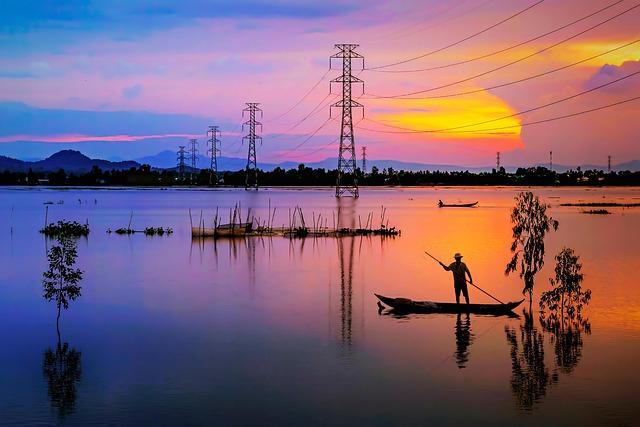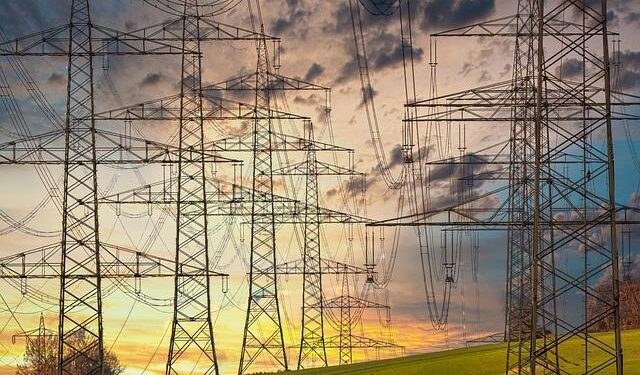In a significant shift in U.S. foreign policy, the Biden administration has officially ended Iraq’s waiver allowing it to import electricity from Iran, a move that could have far-reaching implications for the already strained relations between baghdad and Tehran. The decision comes amid ongoing efforts by the United States to exert pressure on Iran and curb its influence in the region. For iraq, which has long relied on Iranian energy supplies to meet its domestic electricity demands, the termination of this waiver may exacerbate the country’s ongoing energy crisis and spark further instability. This article explores the ramifications of this policy change, the geopolitical landscape influencing it, and the potential challenges that lie ahead for Iraq as it navigates its energy needs without Iranian support.
Impact of U.S. Decision on Iraq’s energy Landscape

The recent decision by the United States to end Iraq’s waiver for purchasing Iranian electricity marks a significant shift in the region’s energy dynamics. This move comes at a time when Iraq heavily relies on Iranian energy imports to meet its daily electricity needs,with around 30% of its electricity coming from Iran. With the waiver lifted, Iraq faces the challenge of securing alternative energy sources while grappling with ongoing infrastructural issues and a rising demand for power among its population. The implications of this policy change not only affect the energy security of Iraq but also pose potential geopolitical ramifications as the nation navigates its relationships with neighboring countries and seeks to bolster its energy independence.
In light of the recent developments, Iraq must now explore multiple avenues to diversify its energy sources. Options may include:
- Investing in renewable energy projects, such as solar and wind power, to harness its abundant natural resources.
- Negotiating new energy agreements with Gulf Cooperation Council (GCC) countries to fill the void left by Iranian electricity.
- Enhancing domestic electricity production through modernization and expansion of local power plants.
Additionally, the Iraqi government may need to implement policies aimed at improving energy efficiency and reducing reliance on imported power. This critical juncture could either propel Iraq towards a more sustainable energy future or further complicate its existing energy crisis, depending on how effectively it manages the changes ahead.
Consequences for Iran’s Electricity Exports to Iraq

The recent decision by the United States to end Iraq’s waiver for purchasing Iranian electricity will have significant ramifications for both countries. Iraq, heavily reliant on Iranian power, has struggled with electricity supply issues for years, making this sudden shift a potential crisis. The cancellation of the waiver means Iraqis could face an uphill battle in maintaining their energy needs, as Iranian electricity supplies are crucial during peak consumption periods. With the upcoming summer months, marked by soaring temperatures, the urgency of this situation cannot be overstated.
Moreover, Iran’s economy may also bear the brunt of this decision. Electricity exports to Iraq have been a vital source of revenue, and losing this market could exacerbate the economic constraints already faced by Tehran due to international sanctions. As political dynamics continue to shift in the region, both Iran and Iraq must explore alternative energy solutions to mitigate the fallout. Potential measures could include:
- Investing in renewable energy sources within Iraq
- Strengthening energy trade relationships with neighboring countries
- Enhancing domestic electricity production capabilities
The overall impact will largely depend on how effectively both governments react to these challenges. Failure to find viable alternatives could lead to increased public discontent and strife in Iraq, while Iran may find itself with a surplus of unused electricity production capacity, further tightening its economic situation.
Economic Ramifications for iraq Amidst Energy Crisis

the recent decision by the US to revoke Iraq’s waiver for purchasing Iranian electricity marks a significant turning point in the country’s energy strategy and economic landscape. This shift not only exacerbates the ongoing energy crisis but also places overwhelming pressure on Iraq’s already fragile economy. With the loss of Iranian electricity,which constituted a significant portion of Iraq’s power supply,the nation may face increased blackouts,leading to public unrest and dissatisfaction with the government. Key challenges stemming from this waiver termination include:
- Rising Energy Costs: Dependence on more expensive alternatives to meet energy demands.
- Inflationary Pressures: Increased costs of electricity may contribute to broader inflation levels.
- Public Discontent: Heightened risk of protests as citizens grapple with worsened living conditions.
Moreover, the economic ramifications extend beyond immediate energy concerns, affecting the nation’s fiscal stability and international relations. iraq’s government may find itself in a precarious position as it seeks to negotiate new energy agreements and secure investments in alternative energy sources. The urgency to diversify its energy portfolio has never been more apparent. The government is considering options such as:
- Investment in Renewable Energy: Exploring solar or wind energy projects to reduce reliance on foreign electricity.
- Strengthening Infrastructure: Upgrading existing power grids to improve efficiency and reduce losses.
- International Partnerships: Seeking collaboration with other nations to bolster energy security.
| Impact Area | Description |
|---|---|
| Energy Security | Loss of reliable power sources from Iran. |
| Economic Growth | Reduced investor confidence due to instability. |
| Social Stability | Increased likelihood of public protests over power supply. |
Regional Stability and geopolitical Tensions following Policy Change

The decision to end Iraq’s waiver for purchasing Iranian electricity has significant implications for regional stability and the delicate balance of geopolitical relations. As Iraq has increasingly relied on Iranian energy imports, this policy shift could exacerbate energy shortages in the nation, leading to social unrest and political instability. With the Iraqi government facing pressure to find alternative sources of electricity, the potential for increased domestic turmoil grows. Moreover, this move reflects the broader strategy of the United States to counter Iranian influence in the region, indicating a tightening grasp on Iraq’s foreign policy decisions.
This development may also trigger a series of reactions from neighboring countries, perhaps amplifying existing tensions. The following factors are critical to consider:
- economic Impact: Iraq’s economy, heavily tied to electricity imports, risks suffering from increased energy costs and inadequate supply.
- Regional Alliances: Countries in the Middle east may be drawn into a reshaping of alliances as Iraq navigates its relationship with both the US and Iran.
- Security Concerns: Heightened unrest in Iraq could create a power vacuum, increasing the risk of extremist groups exploiting the situation.
Ultimately,this policy change has the potential to recalibrate not just Iraqi politics,but the broader middle Eastern geopolitical landscape. The interplay between internal stability and external pressures raises critical questions about Iraq’s future as it seeks to chart a path amid competing influences.
Strategies for Iraq to Address its Energy Needs Post-Waiver

The recent decision by the United States to end Iraq’s waiver for importing Iranian electricity presents a significant challenge to Iraq’s energy sector.In response, the Iraqi government must adopt a multifaceted approach to ensure energy security and sustainability. This involves increasing investments in renewable energy sources such as solar and wind, which offer a viable alternative to reliance on imported electricity. Additionally, enhancing energy efficiency in buildings and industries can reduce overall electricity demand, alleviating pressure on existing power grids.
Moreover, fostering regional partnerships is crucial for Iraq’s long-term energy strategy. By collaborating with neighboring countries for electricity interconnections and participating in regional energy markets, Iraq can diversify its energy supply sources.The government should also prioritize the development of local energy production facilities and the modernization of existing power plants to improve grid reliability. A comprehensive energy policy that balances the need for immediate energy access with long-term sustainability will be essential for navigating the post-waiver landscape.
Long-term Implications for U.S.-Iran Relations in the Energy Sector

The recent decision to terminate Iraq’s waiver for purchasing Iranian electricity is likely to have significant ramifications for U.S.-Iran relations, particularly within the energy sector. this move could further intensify the strain on Iran’s already precarious economic situation, which heavily relies on energy exports.The implications might unfold in several ways, including:
- energy Dependency: Iraqi reliance on Iranian electricity could foster a deeper rift, pushing Baghdad to seek alternatives from other suppliers, including Kuwait or Saudi Arabia.
- Regional Tensions: Reduced Iranian energy exports may exacerbate regional tensions,prompting Iran to retaliate through non-conventional means to maintain influence.
- Market Dynamics: Changes in supply chains may alter regional electricity markets,potentially leading to volatility in energy prices and availability.
Furthermore, this waiver cancellation could signal a broader U.S. strategy aimed at exerting pressure not only on Iran but also on other nations that conduct business with it. The ripple effects may disrupt established partnerships in the Middle East and complicate diplomatic ties, resulting in:
- Increased Sanctions: the likelihood of additional sanctions on entities involved in Iranian energy transactions may rise.
- Shift in Alliances: Countries in the region may realign their energy policies, seeking more favorable relationships with the U.S. and its allies.
- Economic Isolation: Iran may face greater economic isolation, prompting it to pivot further towards alternative alliances, particularly with Russia and China.
Closing Remarks
the United States’ decision to end Iraq’s waiver allowing the import of Iranian electricity marks a significant shift in the geopolitical landscape of the region. This action reflects ongoing tensions between the U.S. and Iran, while also posing challenges for Iraq, which relies heavily on Iranian energy supplies to meet its electricity demands.As Iraq grapples with the implications of this change, the focus now shifts to potential alternatives and the impact on its already strained infrastructure. The forthcoming response from Iraqi officials, as well as the broader regional consequences, will be crucial to watch in the coming months. The dynamics of energy security, foreign relations, and regional stability continue to evolve, influencing the future of Iraq and its role within the Middle East.














